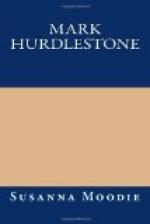“I look so ill to-day, aunt, I am ashamed of being seen.”
“It is matter of little consequence, I dare say; no one will notice how you look. A few years hence, and there would be some excuse for spending so much time before a looking-glass.”
The ladies entered the drawing-room as dinner was announced. If Juliet was dissatisfied with her appearance, Anthony thought that she looked most beautiful, and was delighted to find himself seated beside her. How gladly would he have improved this opportunity of conversing with her, but the natural shyness of his disposition became doubly distressing when he most wished to surmount it; and, with a thousand thoughts in his heart and words upon his tongue, he remained silent. Juliet was the first to speak.
“You were out fishing last night, Mr. Anthony. Were you successful?”
“I am always successful, Miss Whitmore. But, after all, it is a cruel and treacherous sport. I feel ashamed of myself for entering into it with such zest. Destruction appears to be a principle inherent in our nature. Man shows his tyrannical disposition in finding so great a pleasure in taking away from the inferior animals the life which he cannot restore.”
“You are too severe,” returned Juliet. “We are apt to forget during the excitement of the moment the cruelty we inflict. I read old Izaak Walton when a child. He made me mistress of the whole art of angling. It is such a quiet contemplative amusement. The clear stream, the balmy air, the warbling of happy birds, the fragrant hedge-rows and flowery banks, by which you are surrounded, make you alive to the most pleasing impressions: and amidst sights and sounds of beauty, you never reflect that you are acting the part of the destroyer. I have given up the gentle craft; but I still think it a strangely-fascinating sport.”
“I should be sorry to see you so engaged,” said Anthony. “I never could bear to witness so soft a hand employed in taking away life.”
“You, too, have learned the art of flattery,” said Juliet, reproachfully. “When will your sex, in speaking to ours, learn to confine themselves to simple truth?”
“When the education of woman is conducted with less art, and they rise superior to the meanness of being pleased with falsehood. What I said just now was but the simple truth. I admit that it was said to please, and I should, indeed, be grieved, if I thought that I could possibly have given offence.”
He looked so serious and anxious, that Juliet burst into a merry laugh.
“A very heinous crime, indeed, and deserving a very severe punishment! What shall it be?”
“Another lecture from those lips. Remember, I did not say, sweet lips.”
“Worse and worse. I will abandon the lectures for the future, for, I perceive, that to complain to a gentleman of his using compliments, only induces him to make a dozen more, in order to atone for his first offence.”




